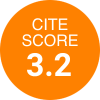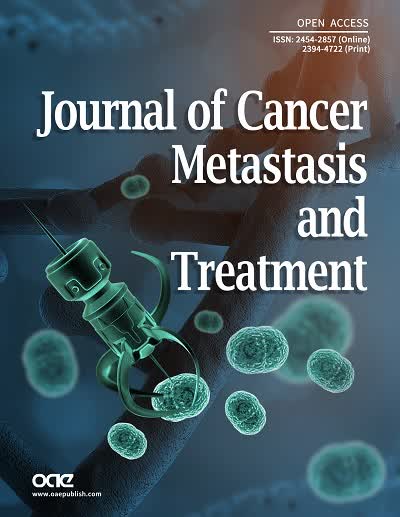REFERENCES
1. Hellmann MD, Ciuleanu TE, Pluzanski A, Lee JS, Otterson GA, et al. Nivolumab plus ipilimumab in lung cancer with a high tumor mutational burden. N Engl J Med 2018;378:2093-104.
2. Le DT, Uram JN, Wang H, Bartlett BR, Kemberling H, et al. PD-1 blockade in tumors with mismatch-repair deficiency. N Engl J Med 2015;372:2509-20.
3. Reck M, Rodriguez-Abreu D, Robinson AG, Hui R, Csoszi T, et al. Pembrolizumab versus chemotherapy for PD-L1-positive non-small-cell lung cancer. N Engl J Med 2016;375:1823-33.
4. Brahmer JR, Lacchetti C, Schneider BJ, Atkins MB, Brassil KJ, et al. Management of immune-related adverse events in patients treated with immune checkpoint inhibitor therapy: american society of clinical oncology clinical practice guideline. J Clin Oncol 2018;36:1714-68.
5. Ventola CL. Cancer immunotherapy, part 2: efficacy, safety, and other clinical considerations. P T 2017;42:452-63.
6. Carretero-Gonzalez A, Lora D, Ghanem I, Zugazagoitia J, Castellano D, et al. Analysis of response rate with ANTI PD1/PD-L1 monoclonal antibodies in advanced solid tumors: a meta-analysis of randomized clinical trials. Oncotarget 2018;9:8706-15.
7. Temel JS, Gainor JF, Sullivan RJ, Greer JA. Keeping expectations in check with immune checkpoint inhibitors. J Clin Oncol 2018;36:1654-7.
8. Fox J, Janda M, Bennett F, Langbecker D. An outreach telephone program for advanced melanoma supportive care: acceptability and feasibility. Eur J Oncol Nurs 2019;42:110-5.
9. Haanen J, Carbonnel F, Robert C, Kerr KM, Peters S, et al. Management of toxicities from immunotherapy: ESMO Clinical Practice Guidelines for diagnosis, treatment and follow-up. Ann Oncol 2017;28:iv119-42.
10. Puzanov I, Diab A, Abdallah K, Bingham CO, Brogdon C, et al. Managing toxicities associated with immune checkpoint inhibitors: consensus recommendations from the Society for Immunotherapy of Cancer (SITC) Toxicity Management Working Group. J Immunother Cancer 2017;5:95.
11. Chen TW, Razak AR, Bedard PL, Siu LL, Hansen AR. A systematic review of immune-related adverse event reporting in clinical trials of immune checkpoint inhibitors. Ann Oncol 2015;26:1824-9.
12. Kottschade LA. Incidence and management of immune-related adverse events in patients undergoing treatment with immune checkpoint inhibitors. Curr Oncol Rep 2018;20:24.
13. Michot JM, Bigenwald C, Champiat S, Collins M, Carbonnel F, et al. Immune-related adverse events with immune checkpoint blockade: a comprehensive review. Eur J Cancer 2016;54:139-48.
14. Postow MA, Sidlow R, Hellmann MD. Immune-related adverse events associated with immune checkpoint blockade. N Engl J Med 2018;378:158-68.
15. Suarez-Almazor ME, Kim ST, Abdel-Wahab N, Diab A. Review: immune-related adverse events with use of checkpoint inhibitors for immunotherapy of cancer. Arthritis Rheumatol 2017;69:687-99.
16. Anagnostou V, Yarchoan M, Hansen AR, Wang H, Verde F, et al. Immuno-oncology trial endpoints: capturing clinically meaningful activity. Clin Cancer Res 2017;23:4959-69.
17. US Department of Health and Human Services - FDA Center for Drug Evaluation and Research. Guidance for industry: patient-reported outcome measures: use in medical product development to support labeling claims: draft guidance. Health Qual Life Outcomes 2006;4:79.
18. Cella D, Wagner L. Re-personalizing precision medicine: is there a role for patient-reported outcomes? J Community Supp Oncol 2015;13:275-7.
19. Cella D, Grünwald V, Escudier B, Hammers HJ, George S, et al. Patient-reported outcomes of patients with advanced renal cell carcinoma treated with nivolumab plus ipilimumab versus sunitinib (CheckMate 214): a randomised, phase 3 trial. Lancet Oncol 2019;20:297-310.
20. Cella D, McKendrick J, Kudlac A, Palumbo A, Oukessou A, et al. Impact of elotuzumab treatment on pain and health-related quality of life in patients with relapsed or refractory multiple myeloma: results from the ELOQUENT-2 study. Ann Hematol 2018;97:2455-63.
21. Bouchard LC, Aaronson N, Gondek K, Cella D. Cancer symptom response as an oncology clinical trial end point. Expert Rev Qual Life Cancer Care 2018;3:35-46.
22. Cella D, Escudier B, Tannir NM, Powles T, Donskov F, et al. Quality of life outcomes for cabozantinib versus everolimus in patients with metastatic renal cell carcinoma: METEOR phase III randomized trial. J Clin Oncol 2018;36:757-64.
23. Basch E, Iasonos A, Barz A, Culkin A, Kris MG, et al. Long-term toxicity monitoring via electronic patient-reported outcomes in patients receiving chemotherapy. J Clin Oncol 2007;25:5374-80.
24. Atkinson TM, Rogak LJ, Heon N, Ryan SJ, Shaw M, et al. Exploring differences in adverse symptom event grading thresholds between clinicians and patients in the clinical trial setting. J Cancer Res Clin Oncol 2017;143:735-43.
25. Basch E, Jia X, Heller G, Barz A, Sit L, et al. Adverse symptom event reporting by patients vs clinicians: relationships with clinical outcomes. J Natl Cancer Inst 2009;101:1624-32.
26. Cella D, Hahn EA, Jensen SE, Butt Z, Nowinski CJ, et al. Patient-reported outcomes in performance measurement. Research Triangle Park (NC): RTI Press; 2015. p. 1.
27. Jim HS, McLeod HL. American society of clinical oncology value framework: importance of accurate toxicity data. J Clin Oncol 2017;35:1133-4.
28. Webster K, Cella D, Yost K. The functional assessment of chronic illness therapy (FACIT) measurement system: properties, applications, and interpretation. Health Qual Life Outcomes 2003;1:79.
29. Aaronson NK, Ahmedzai S, Bergman B, Bullinger M, Cull A, et al. The European Organization for Research and Treatment of Cancer QLQ-C30: a quality-of-life instrument for use in international clinical trials in oncology. J Natl Cancer Inst 1993;85:365-76.
30. Cella D, Riley W, Stone A, Rothrock N, Reeve B, et al. The patient-reported outcomes measurement information system (PROMIS) developed and tested its first wave of adult self-reported health outcome item banks: 2005-2008. J Clin Epidemiol 2010;63:1179-94.
31. Basch E, Reeve BB, Mitchell SA, Clauser SB, Minasian LM, et al. Development of the National Cancer Institute’s patient-reported outcomes version of the common terminology criteria for adverse events (PRO-CTCAE). J Natl Cancer Inst 2014;106.
32. Hall ET, Singhal S, Dickerson J, Gabster B, Wong HN, et al. Patient-reported outcomes for cancer patients receiving checkpoint inhibitors: opportunities for palliative care-a systematic review. J Pain Symptom Manage 2019;58:137-56.e1.
33. King-Kallimanis BL, Howie LJ, Roydhouse JK, Singh H, Theoret MR, et al. Patient reported outcomes in anti-PD-1/PD-L1 inhibitor immunotherapy registration trials: FDA analysis of data submitted and future directions. Clin Trials 2019;16:322-6.
34. Rand Corporation. Delphi Method. Available from: http://www.rand.org/topics/delphi-method.html [Last accessed on 4 Mar 2020].
35. Keeney S, Hasson F, Mckenna H. The delphi technique in nursing and health research. Hoboken, New Jersey: Wiley-Blackwell; 2010.
36. Functional assessment of chronic illness therapy (FACIT) searchable library and custom form developer (Build-a-PRO). Available from: https://wizard.facit.org/ [Last accessed on 4 Mar 2020].
37. Bonomi AE, Cella DF, Hahn EA, Bjordal K, Sperner-Unterweger B, et al. Multilingual translation of the functional assessment of cancer therapy (FACT) quality of life measurement system. Qual Life Res 1996;5:309-20.
38. Eremenco SL, Cella D, Arnold BJ. A comprehensive method for the translation and cross-cultural validation of health status questionnaires. Eval Health Prof 2005;28:212-32.
39. Thompson JA, Schneider BJ, Brahmer J, Andrews S, Armand P, et al. Management of immunotherapy-related toxicities, version 1.2019. J Natl Compr Canc Netw 2019;17:255-89.
40. Abdel-Wahab N, Shah M, Lopez-Olivo MA, Suarez-Almazor ME. Use of immune checkpoint inhibitors in the treatment of patients with cancer and preexisting autoimmune disease: a systematic review. Ann Intern Med 2018;168:121-30.
41. Bajwa R, Cheema A, Khan T, Amirpour A, Paul A, et al. Adverse effects of immune checkpoint inhibitors (programmed death-1 inhibitors and cytotoxic T-lymphocyte-associated protein-4 inhibitors): results of a retrospective study. J Clin Med Res 2019;11:225-36.
42. Delanoy N, Michot JM, Comont T, Kramkimel N, Lazarovici J, et al. Haematological immune-related adverse events induced by anti-PD-1 or anti-PD-L1 immunotherapy: a descriptive observational study. Lancet Haematol 2019;6:e48-e57.
43. Hryniewicki AT, Wang C, Shatsky RA, Coyne CJ. Management of immune checkpoint inhibitor toxicities: a review and clinical guideline for emergency physicians. J Emerg Med 2018;55:489-502.
44. Khan S, Gerber DE. Autoimmunity, checkpoint inhibitor therapy and immune-related adverse events: a review. Semin Cancer Biol 2019. Epub ahead of print. doi: 10.1016/j.semcancer.2019.06.012
45. Myers G. Immune-related adverse events of immune checkpoint inhibitors: a brief review. Curr Oncol 2018;25:342-7.
46. Teufel A, Zhan T, Hartel N, Bornschein J, Ebert MP, et al. Management of immune related adverse events induced by immune checkpoint inhibition. Cancer Lett 2019;456:80-7.
47. Calabrese LH, Calabrese C, Cappelli LC. Rheumatic immune-related adverse events from cancer immunotherapy. Nat Rev Rheumatol 2018;14:569-79.
48. Cappelli LC, Gutierrez AK, Baer AN, Albayda J, Manno RL, et al. Inflammatory arthritis and sicca syndrome induced by nivolumab and ipilimumab. Ann Rheum Dis 2017;76:43-50.
49. Sibaud V. Dermatologic reactions to immune checkpoint inhibitors: skin toxicities and immunotherapy. Am J Clin Dermatol 2018;19:345-61.
50. Tan MH, Iyengar R, Mizokami-Stout K, Yentz S, MacEachern MP, et al. Spectrum of immune checkpoint inhibitors-induced endocrinopathies in cancer patients: a scoping review of case reports. Clin Diabetes Endocrinol 2019;5:1.
51. Girotra M, Hansen A, Farooki A, Byun DJ, Min L, et al. The current understanding of the endocrine effects from immune checkpoint inhibitors and recommendations for management. JNCI Cancer Spectr 2018;2:pky021.
52. Lacouture M, Sibaud V. Toxic side effects of targeted therapies and immunotherapies affecting the skin, oral mucosa, hair, and nails. Am J Clin Dermatol 2018;19:31-9.
53. Reddy HG, Schneider BJ, Tai AW. Immune checkpoint inhibitor-associated colitis and hepatitis. Clin Transl Gastroenterol 2018;9:180.
54. Benfaremo D, Manfredi L, Luchetti MM, Gabrielli A. Musculoskeletal and rheumatic diseases induced by immune checkpoint inhibitors: a review of the literature. Curr Drug Saf 2018;13:150-64.
55. Wang ZH, Shen L. Management of gastrointestinal adverse events induced by immune-checkpoint inhibitors. Chronic Dis Transl Med 2018;4:1-7.
56. Delaunay M, Cadranel J, Lusque A, Meyer N, Gounant V, et al. Immune-checkpoint inhibitors associated with interstitial lung disease in cancer patients. Eur Respir J 2017;50:pii: 1700050.
57. Mayo Clinic Website. Available from: https://www.mayoclinic.org/ [Last accessed on 4 Mar 2020].
58. Hansen AR, Ala-Leppilampi K, McKillop C, Siu LL, Bedard PL. Development of the functional assessment of cancer therapy-immune checkpoint modulator (FACT-ICM): a scale to measure quality of life in cancer patients treated with ICMs. IASS J 2020. Epub ahead of print. doi: 10.1002/cncr.32692








